
The 1896 Summer Olympics, officially known as the Games of the I Olympiad and commonly known as Athens 1896, were the first international Olympic Games held in modern history. Organised by the International Olympic Committee (IOC), which had been created by French aristocrat Pierre de Coubertin, the event was held in Athens, Greece, from 6 to 15 April 1896.

Launceston Elliot was a British weightlifter, and the first athlete representing the United Kingdom to become an Olympic champion.
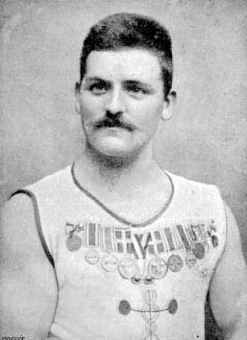
Alexander Viggo Jensen was a Danish weightlifter, sport shooter, gymnast, and athlete. He was the first Danish and Nordic Olympic champion, at the 1896 Summer Olympics in Athens.

At the 1900 Summer Olympics one gymnastics event for men was contested. The competition was held on Sunday, 29 July 1900, and on Monday, 30 July 1900. There were 135 competitors from 8 nations. The top 18 places were taken by French gymnasts, of which there were more than 100. The event was won by Gustave Sandras, with Noël Bas finishing second and Lucien Démanet third. The highest-placing foreign gymnast was Jules Ducret of Switzerland, in a tie for 19th place.
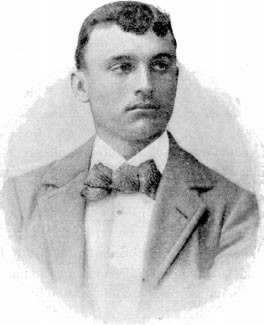
Nikolaos Andriakopoulos was a Greek gymnast. He was a member of Panachaikos Gymnastikos Syllogos, that merged in 1923 with Gymnastiki Etaireia Patron to become Panachaiki Gymnastiki Enosi.
Thomas Xenakis was a Greek gymnast. He competed at the 1896 Summer Olympics in Athens. He was born in Naxos and died in Orange, California, United States.

Three athletes from Denmark competed in five sports at the 1896 Summer Olympics in Athens. Two of the three combined to win a gold medal, two silvers, and three bronzes, while Eugen Schmidt earned no medals. Viggo Jensen contributed one of each color, while Holger Nielsen earned the second silver and two bronzes. Shooting and weightlifting were Denmark's most successful sports. Denmark had 15 entries in 12 events, winning six medals.

Germany competed at the 1896 Summer Olympics in Athens, Greece. The Germans were the third most successful nation in terms of both gold medals and total medals (13). Gymnastics was the sport in which Germany excelled. The German team had 19 athletes. The Germans had 75 entries in 26 events, taking 13 medals.

Ten athletes from the United Kingdom of Great Britain and Ireland competed in seven sports at the 1896 Summer Olympics. The Great Britain athletes were the fifth most successful in terms of overall medals (7) and tied for fifth in gold medals (2). The 7 medals came on 23 entries in 14 events.

Greece was the host nation of the 1896 Summer Olympics held in Athens. The number of Greek contestants is commonly cited as 169, but as many as 176 Greeks contested events in all nine sports. The Greeks were by far the most successful nation in terms of total medals with 47, 27 more than the United States of America. Nevertheless, their number of first-place finishes (10) was one fewer than the Americans' 11. The Greeks had 172 entries in 39 events. Only 4 events had no Greek entrants—the 400 metres and the high jump in athletics and the vault and the team horizontal bar in gymnastics.

The first heat of the men's 100 metres race was the first event run at the modern Olympics, on 6 April 1896. The event consisted of 3 heats and a final, held on 10 April. The 100 metres was the shortest race on the Athletics at the 1896 Summer Olympics programme. 15 athletes from 8 nations competed. The event was won by Thomas Burke of the United States. Fritz Hofmann of Germany took second, with Hungarian Alajos Szokolyi and American Francis Lane tying for third. These competitors are recognized as gold, silver, and bronze medalists by the International Olympic Committee, though that award system had not yet been implemented in 1896.
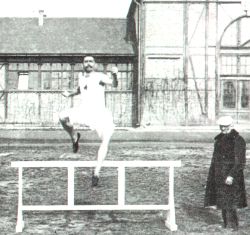
The men's 110 metres hurdles was the only hurdling event on the Athletics at the 1896 Summer Olympics programme. The preliminary heats were the first track event of the day on 7 April. Eight competitors ran in two heats of four runners each. Only the fastest two runners in each heat advanced to the final. The event was won by Thomas Curtis of the United States.

The men's 10 kilometres was one of the five track cycling races on the Cycling at the 1896 Summer Olympics programme. It was held on 11 April and comprised 30 laps of the track. The 1896 Games was the only time that the 10 kilometres track race was part of the cycling program at an Olympic Games. Six cyclists from four nations competed. The event was won by Paul Masson of France, the second of his three victories that day. His countryman Léon Flameng finished second, while Austrian Adolf Schmal was third.
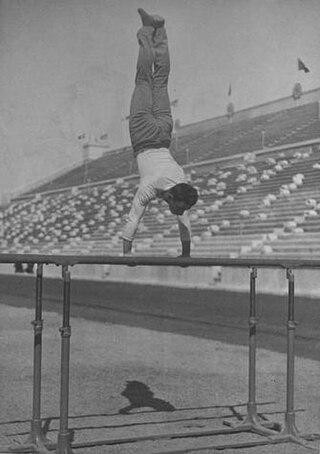
The men's parallel bars was one of eight gymnastics events on the Gymnastics at the 1896 Summer Olympics programme. The parallel bars event was held on 10 April, the seventh gymnastics event to be held. 18 gymnasts from six nations competed, with the judges announcing Alfred Flatow as the winner and Louis Zutter as the runner-up.

The men's vault was one of the eight gymnastics events on the Gymnastics at the 1896 Summer Olympics programme. The third event, it was held on 9 April. 15 athletes from five nations competed. The Germans captured the gold and bronze medals, while Zutter won the silver for Switzerland.
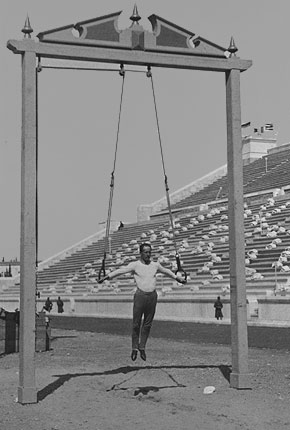
The men's rings was one of eight gymnastics events on the Gymnastics at the 1896 Summer Olympics programme. The fifth event, it was held on 9 April. There were eight competitors from three nations. The Greeks won the gold and bronze medals, with Hermann Weingärtner winning his fifth medal. Places 1–3 and 5 are known, but 4th place is not—any of the four athletes whose places are not known may have occupied the fourth position.

The men's two hand lift was one of two weightlifting events held as part of the Weightlifting at the 1896 Summer Olympics program. The two-handed lift was the first weightlifting event on 7 April. Six athletes took part. Viggo Jensen of Denmark and Launceston Elliot of the United Kingdom both lifted 111.5 kilograms, and the tie was broken by a determination by Prince George that Jensen had performed the lift with better form than had Elliot. A protest by the British delegation resulted in each athlete being given further attempts to improve their scores. Neither did, and the results stood as originally declared with Jensen taking the gold medal. Jensen had, however, suffered from the extra lifts in that he experienced a slight injury in trying to lift more than he was able.

The men's individual all-around, also known as the heptathlon, was one of two gymnastics events on the Gymnastics at the 1908 Summer Olympics programme. As suggested by the alternate name, the competition included seven events with the scores summed to give a final score. Each nation could enter up to 20 gymnasts, with France and Great Britain each entering the maximum. A total of 97 gymnasts from 12 nations competed. The event was won by Alberto Braglia of Italy, the nation's first medal in the men's individual all-around. Silver went to Walter Tysall of Great Britain, the first medal for the nation as well. France's Louis Ségura earned bronze.

The men's rope climbing was an artistic gymnastics event held as part of the gymnastics programme at the 1904 Summer Olympics. It was the second time the event was held at the Olympics. An unknown number of gymnasts competed; only three are known, all American. The competition was held on Friday, October 28, 1904. George Eyser won the event, with Charles Krause second and Emil Voigt third.

The men's rope climbing event was part of the gymnastics programme at the 1932 Summer Olympics. It was contested for the fourth and last time after 1896, 1904, and 1924. The competition was held on Wednesday, August 10, 1932. Five gymnasts from two nations competed. All three medalists were from the host nation, as Americans Raymond Bass, William Galbraith, and Thomas F. Connolly took the honors.


















